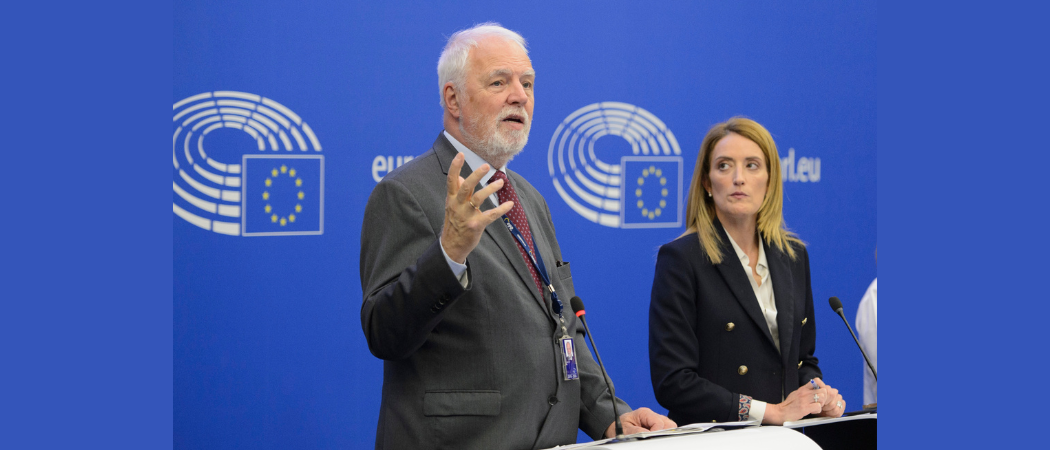Parliament votes to prevent money being taken away from Horizon Europe’s Pillar II to fund the Strategic Technologies for Europe Platform

MEP Jan Olbrycht speaking alongside president of the European Parliament Roberta Metsola during a press conference on the reform of the EU's long-term budget. Photo: Michel Christen / European Union
The European Parliament is set to defend Horizon Europe’s Pillar II from cuts, as negotiations get underway with member states on the Strategic Technologies for European Platform (STEP).
The MEPs voted through their negotiating position on Tuesday, backing a demand for an extra €3 billion from EU national budgets for STEP, which will give top-ups to four EU programmes advancing its strategic autonomy goals.
The proposal suggests €800 million of the top-up proposed by the Parliament should be used to prevent a cut to Horizon Europe’s Pillar II, as was originally proposed by the European Commission.
The Commission suggested taking €800 million from the Horizon Europe budget for large-scale collaborative research projects and diverting it to the programme’s European Innovation Council (EIC) Accelerator Fund, which awards equity funding to start-ups, as part of the STEP proposal.
STEP is a newly proposed platform, for which the Commission wants the member states to find €10 billion in their national budgets, to give top-ups to parts of the EU budget that contribute to the bloc’s strategic autonomy goals in deep tech, clean tech and biotech. The EIC Accelerator is one of them.
But the Parliament’s bid will not be easy to sell to member states, which are reluctant to dish out more money to the EU from their national budgets. Under the European Commission proposal for STEP, they’re already being asked for €10 billion in fresh commitments.
One of the Parliament’s rapporteurs for the file, MEP Jan Olbrycht, says the demand is not as unrealistic as some believe. “We are rational. We are pragmatic,” he argued at the final plenary debate on the matter. “We want to show that you can’t propose actions for the citizens and then not put aside the funds to make it happen.”
The ball is now in the court of the Council, where negotiations between the member states are taking place daily at various levels to agree a joint position to take into negotiations with the Parliament. The member state talks include a debate between the heads of state at the next European Council meeting at the end of October.
The goal is to conclude negotiations on the file by the end of the year so as to allow STEP to come into effect in 2024. It’s going to be a rush and an agreement will not be easy, especially when it comes to extra funding from national budgets. “We have to try to reconcile these changes with national budgets,” Pascual Navarro Ríos, representing the current Spanish presidency of the Council, told the MEPs.
The Parliament’s proposal for a €3 billion top-up also foresees €1.2 billion extra for the Invest EU fund and €1 billion for dual use technology funded through the European Defence Fund (EDF).
Tech sovereignty vs research
The Commission’s habit of cutting into the budget of the €95.5 billion Horizon Europe research programme to find money for political priorities has been one of the research community’s biggest worries in the last couple of years. When the STEP proposal came through in June, alarms went off once again.
The original Commission proposal suggested the EIC part of STEP should be funded by €500 million of ‘fresh’ money, €800 million of funds diverted from Pillar II and €1.2 billion from unused research funds.
The Parliament’s negotiating stance, if accepted, could prevent the cuts to Pillar II while maintaining the €2.6 billion proposed top-up for the EIC Accelerator as part of STEP.
Now, it’s up to research ministries to argue in favour of a solution that prevents the shuffling of Horizon funds within the Council. They won’t be the ones sitting at the negotiating table for this file, but insiders say science counsellors and staff in research ministers are being consulted on the matter.
The STEP proposal, put forward in June as part of the EU’s mid-way weigh in of its seven-year budget, is being rushed through the Parliament and the Council in an attempt to find a deal by the end of the year so that STEP can come into force in 2024.
There’s consensus that extra efforts are needed to defend the EU’s strategic autonomy, making STEP a matter of priority. “We need to set up the STEP programme as the first step,” said the Parliament’s other rapporteur for the file, MEP Margarida Marques. “Then, we need to create deep, clean and green biotechnologies. We need to maximise research and technological development in Europe. We must support green industrialisation and we must also ensure we create better job opportunities.”
The original idea proposed by the Commission President Ursula von der Leyen was to set up a dedicated European Sovereignty Fund. This proved to be complicated and thus the platform for budget top-ups was born. It’s limited in size but has potential, according to the Parliament. “The STEP proposal should act as a testbed for a fully-fledged Sovereignty Fund in the next [seven-year budget] period,” the report adopted on Tuesday says.





 A unique international forum for public research organisations and companies to connect their external engagement with strategic interests around their R&D system.
A unique international forum for public research organisations and companies to connect their external engagement with strategic interests around their R&D system.